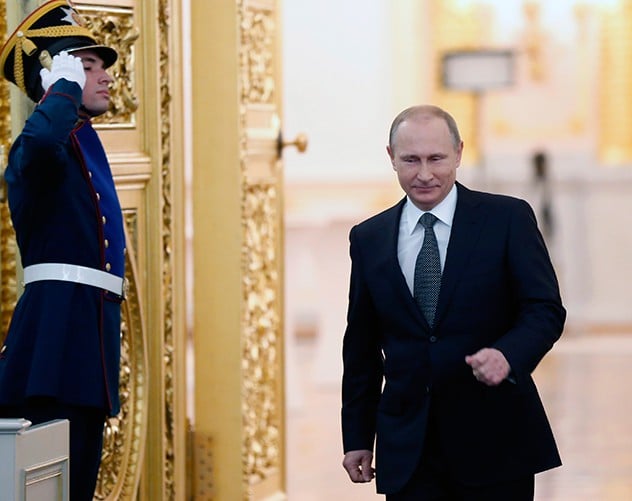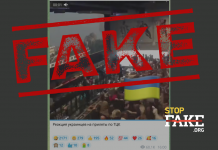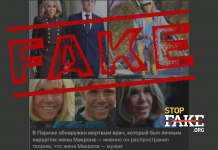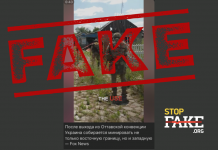Thursday, December 4 president Vladimir Putin came out with a message to the Federal Assembly of Russia. This is a yearly ritual, it’s point is to retell the priorities of the inner policy, to discuss the achieved and to dream about achievable, so the MPs, officials, members of power ministries and all sympathisers could compare their notes with the president and become encouraged for the effective work. The message was awaited because of the growing economic crisis and rare distinctive signals from the authorities: Putin ignored the Budget message in Autumn, obviously being unwilling to comment on the budget of 2015-2017, as it had become outdated even before it was approved.
This time the president decided not to sadden the day with enumeration of economic problems, but to concentrate on Russia’s achievements in standing for “the diversity of the world”, great sport and demography. Though he mentioned programme thesis about the support of national production, small business and NPO.
Syrbylai Aibusinov of Slon.ru checked the speech of Putin for facts and found a number of points at issued.
| 1 | ||
| Of course, we will talk about this year’s landmark events. You know that a referendum was held in Crimea in March, at which its residents clearly expressed their desire to join Russia. After that, the Crimean parliament – it should be stressed that it was a legitimate parliament that was elected back in 2010 – adopted a resolution on sovereignty. | ||
Putin made stress on the vote of March 16 2014, not mentioning that on March 11 the same parliament and the city council of Sevastopol accepted the “Declaration of Independence of Autonomous Republic of Crimea and the city of Sevastopol”, which included the three stages of integration of Crimea into the Russian Federation.
Nobody disputed the legitimacy of Crimean parliament, so Putin objects an non-existing opponent. Ukrainian side objected there had been a quorum on the session of Crimean parliament, which had accepted the decision to hold the vote. There were reports of pressure on the parliament.
After the vote Crimean parliament addressed the parliament of the Russian Federation and pleaded for the immediate admission of the Republic of Crimea and Sevastopol as federal subjects of Russia and part of the Russian Federation in the form of a declaration “Declaration of independence of the Republic of Crimea” (though it sounds absurd, since Crimea was losing its independence entering the Russian Federation). The scheme of events’ development, chosen by Putin makes emphasis on the people’s will, though the annexation was initiated by the Crimean MPs.
| 2 | ||
| the peninsula is of strategic importance for Russia as the spiritual source of the development of a multifaceted but solid Russian nation and a centralised Russian state. It was in Crimea, in the ancient city of Chersonesus or Korsun, as ancient Russian chroniclers called it, that Grand Prince Vladimir was baptised before bringing Christianity to Rus. | ||
Putin puts the sign of equality between between ancient Rus (with capital in Kiev) and modern Russian (with capital in Moscow, first time mentioned in the Hypatian Codex, date 1420). With this attitude it is hard to understand the role of Ukrainian people, who are hardly a part of the “solid Russian nation”. If they are still a part of the “united Russian nation” in Putin’s version of history, the logic is even poorer: why are Ukrainian people denied their right to own the place, which is sacred for them? The baptism of Vladimir was analysed by an economist Andrei Illarionov – he provided evidence from historians that Vladimir had been baptised in Vasiliov (a town near Kiev), not in Chersonesus.
| 3 | ||
| It is hard to believe that it all started with a technical decision by President Yanukovych to postpone the signing of the Association Agreement between Ukraine and the European Union. Make no mistake, he did not refuse to sign the document, but only postponed it in order to make some adjustments. As you recall, this move was fully in line with the constitutional authority vested upon an absolutely legitimate and internationally recognised head of state. Against this background, there was no way we could support this armed coup, the violence and the killings. | ||
Yanukovych’s decision to postpone signing the document meant giving up the Association. Ukraine’s president made this decision after negotiations with Russia, which showed to sign the document, Ukraine needed Kremlin’s approval and, as the official document stated, “the elimination of antagonism in the economic cooperation between Ukraine and the countries of the Eurasian Economic Union”.
Yet, the protest, linked to the refusal to sign the document, was completely peaceful. The conflict in Kiev began after the unjustified attempt by the authorities to use brute force to stop Euromaidan on November 30, a year ago.
| 4 | ||
| All the arguments that Russia and Ukraine are members of the CIS free-trade zone, that we have deep-rooted cooperation in industry and agriculture, and basically share the same infrastructure – no one wanted to hear these arguments, let alone take them into account. Our response was to say: fine, if you do not want to have a dialogue with us, we will have to protect our legitimate interests unilaterally and will not pay for what we view as erroneous policy. So what’s came out of it all? The agreement between Ukraine and the European Union has been signed and ratified, but the implementation of the provisions regarding trade and economy has been postponed until the end of next year. Doesn’t this mean that we were the ones who were actually right? | ||
Putin would have been right, if the CIS free-trade zone was an arena for fair competition, yet Russia always resorts to invisible limitations in trading. Ukrainian companies faced prohibiting to deliver animal products, confectionery and rail buses to Russia, as well as quotas for pipes delivery. Russia always declared the policy of import substitution, willing to stop buying helicopter parts and equipment for nuclear power stations, which are a significant part of Ukrainian export. Because of such often punishments, the advantages for Ukraine for staying in CIS free-trade zone are quite questionable. The outcome was easy to predict. Even in peaceful 2013, according to the information of State Statistics Service of Ukraine, Ukraine’s turnover with the EU was $16.76 billion versus $15.07 billion with Russia.
The numbers of the recent months do not back up Russia’s being right, but that the importance of CIS market for Ukraine was decreasing: its export to Russia and CIS dropped by 30%, while its export to the EU increased by 24%.
| 5 | ||
| By the way, Russia has already made a major contribution to helping Ukraine. Let me reiterate that Russian banks already invested some $25 billion in Ukraine. Last year, Russia’s Finance Ministry extended a loan worth another $3 billion. Gazprom provided another $5.5 billion to Ukraine and even offered a discount that no one promised, requiring the country to pay $4.5 billion. Add it all up and you get as much as $ 32.5-33.5 billion that were provided only recently. | ||
According to the information of RBC sources, the $25 billion invested by Russian banks according to Putin – are not the recent investments into Ukraine’s economy, but the estimate loss of Russian banks because of distressed assets and Ukrainian ‘subsidiaries’. Banks expect Ukrainian credit non-payments and worry their investments into Ukrainian offices will not be paid for: property, staff, business relations. Yet, these investments did not start in 2014, but back in 2000-s (for instance, Alfa-bank works in Ukraine since 2001).
Also, half of the $25 billion are active assets of Ukrainian “subsidiaries”, created not only due of Russia’s investments, these are deposits of Ukrainian people and companies and the profit from them. Besides, Putin himself in the interview for German channel ARD admitted that Russian banks invested into Ukraine loaned money: “If our European and American partners want to help Ukraine, how can they undermine the financial base limiting our financial institutions’ access to world capital markets?”
As for Gazprom supporting Ukraine, even with $100 off per 1.000 cubic metres for Ukrainians now, the price is $385, which is more than the price Ukraine pays to Slovakia.
| 6 | ||
| The Eurasian Economic Union will start working in full on January 1, 2015. | ||
The words “working in full” are not corresponding to facts. According to Member of the Board (Minister) for Trade Andrey Slepnev, the unified marked will start working by 2025. “Part of the services – about 30 sectors – should be provided within the single market right from January 1, 2015. For other sectors – financial services, transport, telecommunications and construction – the governments have agreed to create single markets in the coming years,” stated he, adding that matters with trading dual-use goods, arms, alcohol and energy sources were worse.
| 7 | ||
| Business people talk about the need for stable legislation and predictable rules, including taxes. I completely agree with this. I propose to freeze the existing tax parameters as they are for the next four years, not revisit the matter again, not change them. | ||
It is impossible to fix fiscal conditions for four years: since second half-year of 2015 the authorities of Moscow, St. Petersburg and Sevastopol can introduce trade tax, the law on which Putin signed on the previous week. Other subjects of the federation will wait for a special federal law, which, probably, will be signed soon.
It is obscure if Putin’s suggestion will have anything with all trades in the country, or will only affect business. The first option is even less realistic: for example, according to another law, adopted recently, since 2015 in Moscow real estate tax will be raised for natural entities, while other regions can do alike.
| 8 | ||
| Of course, a weaker ruble increases the risk of a short-term surge in inflation. It’s imperative that we protect the interests of our people, first and foremost, those with low incomes, and the Government and the regions must ensure control over the situation on the food, medicine and other basic goods markets. I’m sure this can be done without any problem, and it must be done. A weaker national currency also increases the pricing environment and the competitiveness of our companies. We take this factor into account in our policy of import substitution (at least, where it’s appropriate and necessary). Within three to five years, we must provide our customers with high-quality and affordable medicines and food that are produced mostly in Russia. | ||
Again, the logic. In first paragraph Putin assures that stopping prices increase «can be done without any problem, and it must be done». Then he hails the “increase of the pricing environment”, from which Russian companies will benefit. While this means the same increase in prices, for imported goods at least, so Russian manufacturers will gain advantage. Yet, practise has shown that the increase of prices on imported goods in Russia leads to the increase of all other prices. For example, after Russia joined WTO, cheap import lead to limiting prices on certain goods, so Russian manufacturers had to control their prices, even if that meant loss of profit. Embargo of pork and other goods from European countries in August 2014 has lead to prices increasing.
| 9 | ||
| In the early 2000s, UN experts predicted further demographic decline in Russia. According to UN forecasts, the population of our country was supposed to shrink to 136 million people by the end of 2013. On January 1, 2014, the population of Russia was almost 144 million people, 8 million more than forecast by the United Nations. | ||
“The UN experts” made a mistake, nothing else to say. The first number is taken from UN World Population to 2300 report, and if the data of three hundred years is interpolated (diagram on page 44) we still receive 136 billion for year 2014. The truth is, the report is 10 years old – in was published in 2004. Yet, Putin and the deputy prime minister for social affairs Olga Golodets still refer it as an ultimate proof of success of Russian demographic policy.
A fly in the ointment: if we take numbers in the report, which concern Ukraine, where there were no changes in demographic policy, we will see same difference: 42 million of people for 2014 according to the the UN report and 45.4 million in reality. So, there is no demographic miracle, just a lame method, made up by cabinet experts with ambitions to count Earth’s population up to year 2300.
Author: Syrbylai Aibusinov, Slon.ru.





